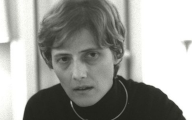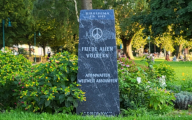Wachsbleiche 16, 53111 Bonn
Petra Kelly (1947 – 1992) was a politician, avowed pacifist, feminist, and a symbolic figure of the peace movement. She was a co-founder of the German party Die Grünen (The Greens) and lived in the north of Bonn in the Tannenbusch district until her death. The funeral service to mark her death took place here in the Beethovenhalle in 1992
Petra Kelly (neé Petra Karin Lehmann) was born in Günzburg (Bavaria) in 1947 and was mostly raised by her grandmother Kunigunde Birle. Her grandmother was one of her closest confidants and supported Kelly in both her political and personal endeavours.
After Petra’s father left the family when she was only seven years old, her mother met John Kelly, a United States Army officer stationed in Germany. The two married in 1959 and the family moved to the USA in the same year, where Petra Kelly’s political involvement later began. While studying Political Science in Washington D.C., she became actively engaged in the Civil Rights Movement. After her studies, she moved to Europe, worked in Brussels, and campaigned for peace, human rights, equal rights, and ecological preservation, among others. Through her commitment to peace, Petra Kelly met her future partner Gert Bastian, a former major general, at a panel discussion in 1980. Together, Kelly and Bastian were regarded as symbolic figures of the German peace movement. At one of the large peace demonstrations in Bonn’s Hofgarten (→ Hofgarten) in 1981, Kelly gave a speech against nuclear weapons and nuclear armament. In this speech, she called for the resignation of Chancellor Helmut Schmidt, who was in favour of stationing nuclear weapons in Germany.
For her many years of commitment to peace, she was awarded the Right Livelihood Award, also known as the Alternative Nobel Prize.
Her commitment also included supporting the citizens’ movement in the German Democratic Republic (GDR). Parts of the movement joined the West German Greens after reunification. This gave rise to today’s Bündnis 90/Die Grünen party (Alliance 90/The Greens). The party and Petra Kelly entered the Bundestag (German Federal Parliament) in 1982 – her political peak. Furthermore, Petra Kelly sought to draw attention to sexism within the so-called “men’s republic”.
Kelly spent the last years of her life more quietly, as she was not re-elected at the 1990 party conference. Her life came to a violent and tragic end in October 1992 when she was only 44 years old. Gert Bastian shot Petra Kelly as she slept next to him and then proceeded to take his own life. The funeral service took place on the 31st of October 1992 with mourners from all around the world in the Beethovenhalle in Bonn. The Tagesthemen, one of Germany’s main daily television news magazines, announced: “Petra Kelly and Gert Bastian are dead. And suddenly, the whole of Bonn – no, the whole of Germany – is shaken.
“Start where you are, don’t wait for better circumstances. They will come automatically the moment you start.” – Petra Kelly
On a further note: In 1989, together with peace researcher Theodor Ebert and others, Kelly founded the Bund für Soziale Verteidigung e. V. (Federation of Social Defense), which still exists today, and was also its founding board member






 Bus and tram stop: Wilhelmsplatz
Bus and tram stop: Wilhelmsplatz 10-minute walk via Welschnonnenstr. to Bertha-von-Suttner-Stele
10-minute walk via Welschnonnenstr. to Bertha-von-Suttner-Stele